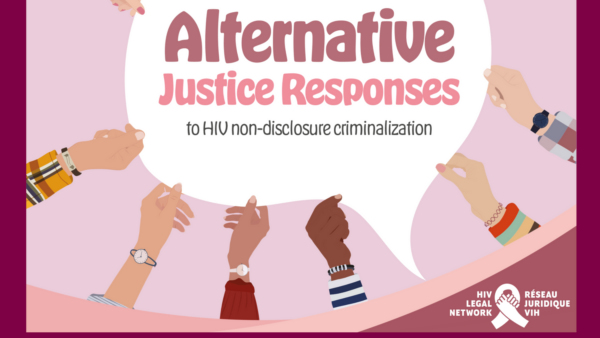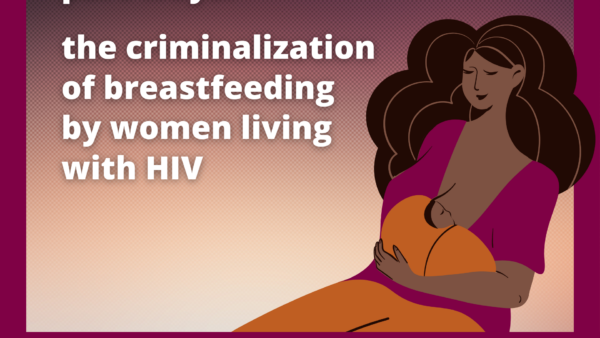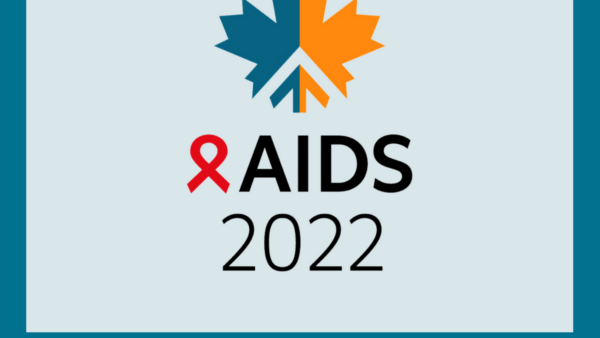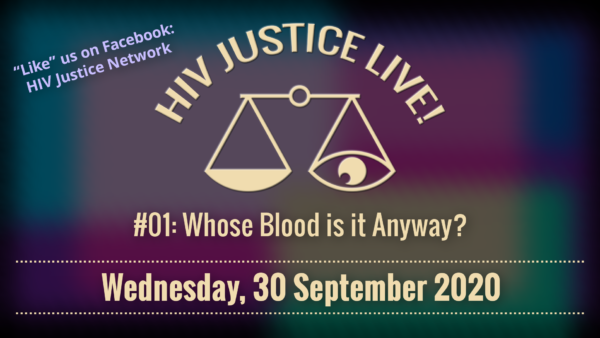Overview
Although there are no HIV-specific laws in Canada, non-disclosure of HIV status has been criminalised under general criminal laws since the first case in 1989, mostly as aggravated sexual assault. The application of general laws to HIV cases has made Canada one of the global hotspots of criminalisation. In recent years, judicial and policy developments have led to a narrowing of the law in some parts of Canada, and a federal review of the law was launched in 2022, but since abandoned.
The federal government retains the power to develop the criminal law across Canada, while the ten provinces and three territories are responsible for enforcing the law and prosecuting cases. As such, the federal Criminal Code applies across the country, and HIV cases are prosecuted under the same provisions in each province and territory, however court interpretation and prosecutorial guidance have led to some differences in the application of the law between them. These developments, and the extent of prosecutions in each jurisdiction, are outlined in the sub-federal overviews linked below, while this section focusses on judicial and policy developments at the federal level.
Although there were a small number of known cases (13) in the decade following the first reported case in 1989, since the 1998 Supreme Court ruling in R. v Cuerrier, HIV non-disclosure has been routinely prosecuted under sexual assault laws. In this case the Court ruled that non-disclosure of HIV status prior to sex may amount to ‘fraud’ vitiating consent to sex in some circumstances. Specifically, the Court stated that the sexual activity must pose a “significant risk of serious bodily harm”. This broad ruling established a precedent that prosecution could occur without intent to transmit or actual transmission, and resulted in substantial numbers of cases, including circumstances where there was in fact little or no risk of transmission, such as sex with an undetectable viral load or with a condom, or oral sex. In effect, this ruling placed an obligation on people living with HIV to disclose their status prior to any sexual activity.
In 2012, the Supreme Court ‘clarified’ the law, finding that criminalisation can occur when sex poses a “realistic possibility of transmission of HIV” (see R. v Mabior and R. v D.C.). These rulings established that there is no duty to disclose before sex, and therefore no criminal liability, if a condom is used and the HIV positive partner has a “low” viral load (under 1500 copies per ml of blood). The question of whether a person might be prosecuted for not disclosing their status in other circumstances, for example where just one of these elements was present, is still evolving and may vary from one province to another depending on court decisions and prosecutorial guidance. However, the Supreme Court in Mabior did acknowledge this possibility, stating that its ruling “does not preclude the common law from adapting to future advances in treatment”.
Although the 2012 ruling represented a narrowing of the law established in 1998, it was still widely criticised as being out of step with scientific evidence, and for permitting continued criminalisation of people in circumstances where there is little to no risk of transmission and/or no intent to transmit. These inadequacies prompted the development of the Canadian Coalition to Reform HIV Criminalization in October 2016, a coalition of people including those living with HIV, community organisations, lawyers, and researchers, whose aim was to advocate for the limitation and, ultimately, eradication of HIV criminalisation in Canada. The Coalition published Consensus Statements in 2017 – endorsed by more than 170 community organisations – and 2022, which outlined its view of HIV criminalisation in Canada and proposed actions to end unjust prosecutions.
Due in large part to the advocacy of the Coalition, there have been a series of positive developments at the federal level in recent years which have narrowed the scope of criminalisation. On World AIDS Day (1 December) 2016, the federal Attorney General publicly recognised the “problem of overcriminalization”, and in 2017, Justice Canada released a report which included recommendations to limit prosecutions. More substantively, a directive was issued by the federal Attorney General to the Public Prosecution Service of Canada in December 2018. This directive instructed federal lawyers to stop prosecuting people who have a suppressed viral load (i.e. under 200 copies/ml) and to “generally” not prosecute people who used a condom, took treatment as prescribed, or only had oral sex, because she concluded that there is likely no realistic possibility of transmission in these circumstances. This directive further narrowed the scope of criminalisation established by the Supreme Court in 2012. Importantly, however, that directive only applies to Canada’s three territories and not to the Canadian provinces, where most people with HIV live. Similar prosecutorial guidance has been issued in some provinces and are discussed in their respective overviews.
In June 2019, the House of Commons’ Standing Committee on Justice and Human Rights released a report in which it recommended removing HIV non-disclosure from the reach of sexual assault law, limiting criminalisation to reckless or intentional transmission of an infectious disease (including HIV) through a new specific offence in the Criminal Code, and implementing prosecutorial directives which precluded criminalisation when certain safeguards are in place – namely where there is an undetectable viral load, condoms are used, the partner is on PrEP, or the sex act only carries a negligible risk – or when transmission does not occur. While encouraging, community advocates retain a goal of limiting HIV criminalisation to cases of intentional transmission only (in keeping with UN recommendations). Moreover, community advocates disagree with the extension of the criminal law to other infections.
Despite the achievements of the Canadian decriminalisation movement, cases continue to be prosecuted. Most cases have been prosecuted as aggravated sexual assault (section 273), although charges of common nuisance, criminal negligence causing bodily harm, administration of a noxious substance, attempted murder, and even murder have occasionally been used. While most cases involved sexual intercourse, a small number have arisen from other acts such as spitting, biting, and giving blood. For instance, in 1993 the Supreme Court upheld a conviction for common nuisance against a man who failed to disclose his HIV status when making a blood donation (see Ontario overview for case details). Public health law can also be used against people living with HIV who do not disclose their status and/or do not use precautions to prevent HIV, with these orders enforceable through the courts. A small number of prosecutions have also been undertaken based on perceived risk of transmission of hepatitis B, hepatitis C and herpes.
Although there is no official record of HIV non-disclosure cases in Canada, research by the HIV Legal Network uncovered at least 224 criminal cases from 1989 to the end of 2020. Non-disclosure cases since 2021, together with a small number of cases relating to non-sexual acts, takes the total to over 230. There was a peak in cases between 2009-2012 before the Supreme Court decision in Mabior reduced prosecutions slightly, while prosecutorial directives have reduced cases more significantly since 2018. The vast majority of cases have taken place in Ontario, Quebec, and British Columbia, with most cases against men (at least 89%), disproportionately involving heterosexual sex, while black and indigenous people have been disproportionately targeted under the laws. Most cases related to HIV ‘exposure’ rather than transmission (64% v 36%). Nonetheless, HIV cases have a very high conviction rate (70%) compared with sexual assault offences generally, and more frequently result in prison sentences.
Important developments at the federal level in 2022 made this a significant year in the fight against HIV criminalisation in Canada. In October 2022, the Supreme Court issued a judgement (on appeal from Alberta, see overview for case details) which struck down mandatory inclusion on the national sex offender registry of all people convicted of a designated sexual offence, instead leaving this to the court’s discretion. Prior to this ruling, all people convicted of HIV non-disclosure were automatically registered as sex offenders.
Also in October 2022, the federal government opened a promised public consultation as part of a review of the country’s laws on HIV non-disclosure. The consultation formed part of the government’s plans to develop a ‘policy roadmap’ for reforming the law, and the public was invited to share views on the current law through an online survey. Justice Minister David Lametti said: “Our government recognizes that the criminalization of people living with HIV can lead to stigmatization and significant hardships. This is why we are consulting Canadians on the best approach to reform the criminal law regarding HIV non-disclosure. It will help us find solutions, and will lead to better outcomes for affected populations.” Advocates continue to argue as part of this consultation for federal reform law to limit HIV criminalisation across the country, noting that differences in judicial and prosecutorial precedents result in overly broad criminalisation in many parts of the country. The online public consultation closed in January 2023. However, ahead of World AIDS Day 2024, it was reported that the federal government had abandoned plans to review the non-disclosure law, leaving repeal in limbo. Cases continue to be reported, most recently in December 2024, but at a much slower pace.
In July 2022, the Supreme Court issued a ruling which may prove relevant to HIV non-disclosure. This case, on appeal from British Columbia, related to an incident in which a man was charged with sexual assault after reneging on an agreement to wear condoms during sex. Both the British Columbia Court of Appeal and the federal Supreme Court took the view, in split decisions, that sex without a condom is a fundamentally different activity to sex with a condom and is capable of vitiating consent. It remains to be seen whether this ruling will have an impact on HIV non-disclosure cases in Canada.
For more information on the current state of the law and prosecutorial guidelines in Canada, visit the HIV Legal Network’s HIV criminalisation microsite.
More information is available on the following states
Laws
Criminal Code
Section 273. Aggravated sexual assault
(1) Every one commits an aggravated sexual assault who, in committing a sexual assault, wounds, maims, disfigures or endangers the life of the complainant.
(2) Every person who commits an aggravated sexual assault is guilty of an indictable offence and liable
(…)
(b) in any other case, to imprisonment for life.
Section 273.1 Meaning of consent
(1) Subject to subsection (2) and subsection 265(3), consent means, for the purposes of sections 271, 272 and 273, the voluntary agreement of the complainant to engage in the sexual activity in question.
Section 265. Assault
(…)
(3) For the purposes of this section, no consent is obtained where the complainant submits or does not resist by reason of
(…)
(c) fraud;
Further resources
This microsite from the HIV Legal Network provides a comprehensive and up-to-date overview and analysis of HIV-related criminalisation in Canada.
From the Center for Interdisciplinary Research on AIDS Yale University: Overview of resources outlining criminal laws and analyses of case laws; empirical research in the US and Canada; legal and public health analyses; guidance, fact sheets and talking points; policy and consensus statements, and other relevant references on criminalization in a North American context.
This article examines the impact of the Supreme Court of Canada decision in R. v Cuerrier from two vantage points: the impact of the decision on HIV nondisclosure prosecutions and the damage done by Cuerrier to sexual assault law outside of the HIV context.
Provides an overview and analysis of criminal cases of HIV exposure and transmission to 2010, and proposes policy options for addressing the problems posed by the criminalization of HIV non-disclosure. Authors: E. Dej & J.M. Kilty
Directive to federal prosecutors regarding HIV non-disclosure cases issued by the Attorney General of Canada on December 8, 2018. Reflect the most recent scientific evidence around sexual transmission of HIV, as analysed by Canada Public Health Agency, as well as applicable criminal law as specified by Canada Supreme Court.
Provides a snapshot of the temporal and demographic patterns of HIV criminalization in Canada from 1989 to 2020, also updating information on the outcomes of criminal cases. Finds people are often convicted in cases involving negligible or no risk of HIV transmission, and that criminal law is increasingly used against people living with HIV from marginalized populations.
Egalement disponible en Français: https://www.hivlegalnetwork.ca/site/hiv-criminalization-in-canada-key-trends-and-patterns-1989-2020/?lang=fr
Explains the criminal law in Canada, including what the law is, basic principles of the law, and the hierarchy of the courts (in HIV Disclosure and the Law: A Resource Kit for Service Providers).
Sets out in clear, concise, and understandable terms a collective expert opinion about HIV sexual transmission, transmission associated with biting and spitting, and HIV as a chronic manageable condition. Authored by six distinguished Canadian HIV clinicians and scientists.
Authors: M. Loutfy, M. Tyndall, J. Baril, J. Montaner, R. Kaul, C. Hankins
Questions whether the offence of aggravated sexual assault can and should be established for HIV non-disclosure in circumstances where, in the Interveners’ submission, there is no “significant risk” of transmission because of factors that dramatically reduce that risk, such as the use of condoms or an undetectable or low viral load
Acknowledgements
One of the world’s leading organisations tackling the legal and human rights issues related to HIV, and advocating at both the policy and community levels.
HIV Justice Network's Positive Destinations
Visit the Canada page on Positive Destinations for information on regulations that restrict entry, stay, and residency based on HIV-positive status, as well as access to HIV treatment for non-nationals.












